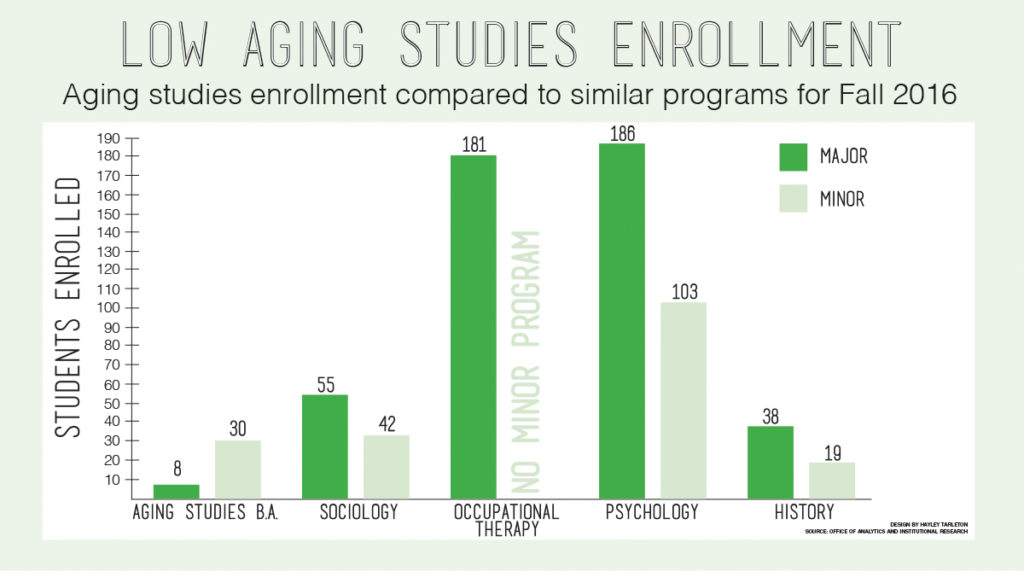Senior Mary Scouten often gets puzzled looks from her classmates when she says her major is aging studies, which is usually followed by a statement like “Why would you want to study old people?”
These remarks stem from a stigma called ageism: the discrimination against people based on their age. Scholars believe ageism and the possible fears associated with death and dying contribute to a common disinterest college students have toward aging studies.
Studies have indicated that this disinterest is problematic because of a growing number of elders in need of health care professionals. As the large baby boomer generation grows older, this demand will increase.
According to the Institute of Medicine study “Retooling for an Aging America: Building the Health Care Workforce,” the shortage of people joining the health care workforce who specialize in care for older adults is going to become an even larger issue. The study indicated that by 2030, an additional 3.5 million health care professionals will be needed to serve approximately 70 million people, according to another study by the Elder Workforce Alliance.
Mary Ann Erickson, associate professor and chair of the Ithaca College Gerontology Institute, said there are 11 students pursuing Bachelor of Arts or Bachelor of Science degrees in aging studies and 35 pursuing minors as of April 2017. She said she believes ageism is something that deters students from majoring or minoring in aging studies.
“There’s, I guess I have to call it an ‘ick factor,’” Erickson said. “A lot of people think that if you major in aging studies, you’re going to spend your time in a nursing home running bingo with frail elders.”
She said there is a wide range of services and opportunities related to aging studies. According to the Gerontology Institute Careers in Aging website, some fields with careers connected to the aging studies major include business administration, physical therapy and integrated marketing communications. Erickson said there is a common misconception among students of what working with elders is like, and that this limits their knowledge of aging related career opportunities.
The Gerontology Institute sponsored Careers in Aging Week at the college from April 2 to 8 to try to stop the stigma and reduce negative stereotypes associated with aging.
Elizabeth Bergman, associate professor in the Gerontology Institute, said the institute has tried to position its courses in a way that will maximize student exposure to aging studies, such as her course Age Matters: The Possibilities Beyond Midlife, which covers the intersections of age and identity in various contexts.
This class was created as a themes and perspectives course for the Integrative Core Curriculum, she said, and students who take the class often take other gerontology classes.
Ashton Applewhite, anti-ageism activist and author of the book “This Chair Rocks: A Manifesto Against Ageism,” said she calls the stigmas surrounding working with older people “age cooties:” the aversion some people have to anything related to old people or aging. She said everyone will reap the benefits if younger people stop distancing themselves from older people just because it reminds them of something frightening, such as growing old or dying.
“Imagine how much happier everyone would be,” Applewhite said. “We’d be way less needlessly afraid. There are scary things about aging, but they’re so much less scary if we actually learn about them.”
Scouten said she believes ageism is widespread among her peers and that it is deterring them from taking gerontology courses.
“It is hard at times to get them to feel the same way about aging as I do,” Scouten said. “I have tried to stress the importance of studying the aging process and maintaining an open mind to aging upon my peers.”
Scouten was a student who took Bergman’s Age Matters class and then decided to major in aging studies.
“I had never even heard of gerontology and thought it sounded interesting,” Scouten said. “It turned out to be an academic epiphany.”
Sophomore Joshua Jacobius said he had a very similar experience when he decided to minor in aging studies. He said he did not think about aging as a field of study and that he even joked about taking a class about old people and aging.
“The biggest thing about this minor for me was that my expectations were completely wrong,” Jacobius said. “I think one of the misconceptions young people have is that we can’t connect with older people, but what I’ve come to realize is that we’re all people. Aging is one of the very few things that we all share.”








